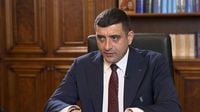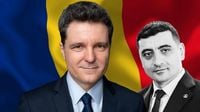As Romania approaches the decisive second round of its presidential election on May 18, the country faces a defining choice about its democratic future and role in Europe. The runoff pits Bucharest Mayor Nicușor Dan, a pro-European centrist, against far-right nationalist George Simion, leader of the Alliance for the Unity of Romanians (AUR). Simion, who emerged as the surprise frontrunner in the first round with around 41% of the vote, is known for his eurosceptic, nationalist rhetoric and a platform that includes opposition to aid for Ukraine and skepticism toward EU integration.
His candidacy has ignited alarm among European lawmakers and civil society advocates who view the election as a referendum on Romania’s place in the EU. Among the first to raise the alarm was Sandro Gozi, Secretary General of the European Democratic Party and a long-standing champion of EU integration. “This is not just Romania’s fight, it’s Europe’s. Nicușor Dan stands for democracy, transparency, and European unity. We must not allow nationalists to hijack the future of an EU member state. I call on all democratic forces, left, right, and center, to unite behind Dan. This is the moment to show that Europe stands together,” Gozi stated.
Valérie Hayer, President of the Renew Europe Group in the European Parliament, echoed the call for unity, saying, “I call on all pro-European democratic Romanians to support him in order to defeat the far-right eurosceptic candidate who came out on top in the first round. Victory on May 18 is essential: Romania’s place is in the European Union, not on the side of Trump or Putin.” Renew Europe in the European Parliament issued its own statement of endorsement: “We support Nicușor Dan, the pro-European presidential candidate in Romania! Our Group stands firmly behind Romania’s European future as it faces a crucial second round of presidential elections on 18 May.”
That future appears increasingly precarious. Simion’s political rise mirrors broader trends in Europe, where far-right parties have gained ground by channeling anti-establishment sentiment and nationalist fervor. For Romania, a country that joined the EU in 2007 and has been one of the bloc’s most enthusiastic members, the stakes are especially high.
The campaign has also become a flashpoint within Romania’s internal politics. In a controversial move, the country’s socialist-aligned delegation in the European Parliament has refused to endorse Nicușor Dan. This silence has drawn sharp criticism from across the democratic spectrum, amid fears that it could tacitly enable a Simion presidency. The European Democratic Party released a strongly worded statement this week, warning of the geopolitical implications of the Socialist stance: “The Romanian Socialists have refused to support Nicușor Dan in the presidential run-off against George Simion. This irresponsible choice could open the door to a Kremlin-friendly presidency. Just yesterday, Putin’s ideologue Alexander Dugin publicly endorsed Simion. Romania needs a strong, pro-European president — not one vulnerable to Putin’s pressure. Wake up, Party of European Socialists. Europe is watching.”
In an analysis of the potential implications of a Simion presidency, political strategist Taras Zahorodnii remarked that while Simion may win, this would not spell disaster for Ukraine. “There are no truly pro-Ukrainian or anti-Ukrainian politicians; they only love themselves, make friendships for money or out of necessity,” Zahorodnii noted. He added, “If anything happens, it will likely be empty talk, like that of Fico (Slovak Prime Minister Robert Fico), who talks a lot but does nothing in reality.”
On May 8, 2025, Simion himself stated he was waiting for compensation for the Patriot air defense system transferred to Ukraine, promising that he would not give a single cent to any other country. This statement raises concerns about his commitment to supporting Ukraine amidst its ongoing conflict with Russia.
The Romanian Constitutional Court unanimously validated the results of the first round of the presidential elections on May 9, 2025, rejecting a request to annul the elections filed by Sebastian-Constantin Popescu, the presidential candidate of the New Romania Party. The runoff, set for May 18, will see ultranationalist leader George Simion face off against independent candidate Nicușor Dan, who is supported by pro-EU parties. In the first round, Simion received 40.96% of the valid votes cast, totaling 3,862,761 votes, while Dan gathered 20.99%, amounting to 1,979,767 votes, from a total of 9.4 million valid votes cast.
On the streets of Bucharest, the atmosphere is charged as thousands rallied in support of the European Union on May 9, 2025, just days before the crucial runoff. An estimated 15,000 people gathered, waving EU and Romanian flags and chanting, “Russia, don't forget Romania is not yours” and “We want our country forward not backward.” Many expressed fears about the implications of a Simion presidency for Romania’s future in the EU.
“I was seriously thinking about taking out a loan for an apartment,” said 26-year-old Petre, who declined to give his last name. “But I don't know that I could do that if George Simion were president. Our EU membership brought us prosperity and security.”
In a televised debate on May 8, 2025, Nicușor Dan, 55, a two-term mayor of Bucharest running as an independent centrist on an “Honest Romania” ticket, fully backed EU plans to arm itself. In contrast, Simion suggested he would veto Brussels military aid to Ukraine while saying that Europe should depend on NATO for its own defense. This stark difference in approach highlights the critical stakes of the election.
As Romania stands on the brink of a pivotal election, the outcome could shape not just the nation’s future but also its role within the European Union and its stance towards neighboring Ukraine. With the world watching, the choice on May 18 will resonate far beyond its borders.





